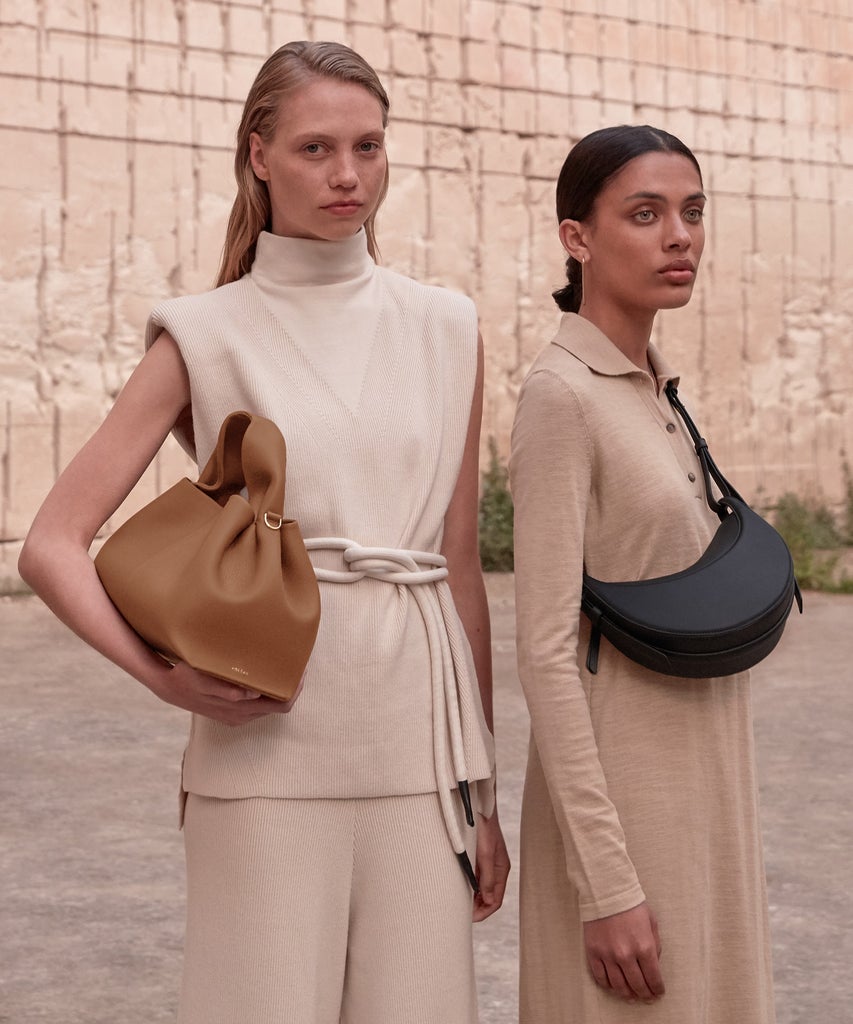.disclaimer{width:90%;margin-bottom:1rem}.disclaimer__lines{width:100%;margin:0 auto;border-bottom:1px solid #999;padding:0;max-width:150px}.disclaimer__copy{width:100%;max-width:355px;font-family:Brown Regular,sans-serif;font-size:.9rem;font-weight:300;line-height:1.3em;color:#333;padding:0 0 .4rem;margin:1rem auto;text-align:center}
Volkan Yilmaz, better known by TikTok pseudonym Tanner Leatherstein, launched his channel in August of 2022, assessing the quality of popular leather handbags by conducting on-camera purse autopsies. Amidst the requests for the Gucci Dionysus and the Prada Cleo was a French brand heretofore unknown to him: Polène. He purchased its Numéro Un style to review, and, post-mortem, he was dumbstruck.
“It changed my life,” he says.
Yilmaz has created a de facto rubric for his handbag assessments perched upon five major pillars: leather, hardware, design, architecture, and craftsmanship. “The Numéro Un checked all those boxes,” he says. “If this was a $2,000 bag, I wouldn’t be surprised, but it was only $430… Luxury brands created this impression that you need to spend thousands of dollars to get a good leather bag, but Polène proved you don’t.”
So impressed by the “masterful” design, the embossed leather, the structural integrity — which he equates to that of renowned luxury brands like Loewe or Louis Vuitton — Yilmaz moved his family to Ubrique, Spain, to manufacture his own leather goods out of the same factories as Polène.
This rare quality-to-value ratio has struck incendiary fervor in the brand’s consumers. Search #Polene on TikTok to reveal 21k posts (with a 143% increase, comparing the first eight months of 2024 to that of 2023). Add “paris” to that hashtag to yield an additional 14.5k posts. TikTok after TikTok exhibits young women in minimalist ensembles unboxing their Cyme totes and documenting trips to one of the few in-person stores to secure the Numéro Un. (Those are two of the brand’s best-selling styles, alongside Numéros Neuf and Dix.) Positive reviews from influential creators like Yilmaz have only helped increase awareness for the French accessories label on the platform. They’re not the only ones paying attention: Earlier this year, L Catterton — the investment fund run by Catterton in partnership with LVMH and Groupe Arnault — acquired a stake in the brand.
Siblings Elsa, Mathieu, and Antoine Mothay — the grandchildren of the founder of French ready-to-wear brand Saint James — launched Polène out of Paris in 2016 with ambitions to “capture the essence of a true leather goods house,” Antoine explains, “which we identified as creativity.” (Antoine is now the CEO and the sole family member still involved in the brand, and is directly responsible for operations, finance, creative direction, and production.) The passed-down sartorial know-how is evident: Polène began with the Numéro Un, and now has thirteen handbag styles (or “collections,” as it bills them), priced between $460 to $690 — luxury sans the status premium — as well as three different jewelry lines.
Reaping the benefits of her first full-time job and corresponding salary, California resident Rida, 23, of Rida Media, was looking to scale up her wardrobe post-graduation, and landed on the best-selling Numéro Dix. She documented her thoughts on TikTok, as she embraced brands like Polène to achieve some semblance of a more sophisticated way of dressing.
The subtly sculptural design of bags like the Numéro Dix, available in an array of muted colors, have helped Rida and many, many others achieve this, especially in the wake of “quiet luxury.” Mothay isn’t mad about the brand’s seat on that train: “The quiet luxury movement speaks to us deeply and resonates with our aspiration for more meaningful fashion.”
Ironically, one of Polène’s biggest, most consequential credits came from the maximalist herself: Emily Cooper of Netflix’s Emily in Paris. Cooper wore the Numéro Huit Mini in season two, then, later, in season three, the Yké. A more like-minded ambassador can be found in the Princess of Wales Kate Middleton, who, in 2022, carried the Numéro Sept Mini in blue twice in one week.
Nowhere is Polène’s fandom more evident than at one of its few brick-and-mortar locations — or the lines outside them. The brand began with a store in its hometown of Paris, then expanded to New York, Tokyo, Seoul, a secondary location in Paris on the iconic Champs-Élysées. (A London location is set to open later this year.) Each store is designed through the same lens as their handbags, thanks to French architect Valériane Lazard, who has engineered the physical manifestation of the brand’s minimalist tendencies. (Rida waited until a trip to New York to purchase her first Polène bag, where she was met with what she describes as excellent customer service.)
Mothay credits the appeal of the bags to the approach behind the design. “Instead of starting with sketches, we begin our process by manipulating microfiber, a material similar to leather,” he says. “This experimental and hands-on approach allows us to directly explore the shapes, curves, and folds that characterize our designs.” The Numéro Neuf, with its folded pillow-y silhouette, is a prime example of this.
Polène places emphasis on modularity, as well: The Cyme tote, for example, boasts strategically placed snaps that can alter the silhouette of the bag, while the Numéro Dix comes with an adjustable shoulder strap not only to shift from shoulder to crossbody wear, but also to adhere to a range of torso lengths. (Rida is 5’1”, and often struggles to find a shoulder bag that hits the right place on her body. This style was her salve.)
The process of production and design, all of which is managed entirely in-house, takes between 16 and 20 months. The leather is sourced from Spanish and Italian certified tanneries. Polène produces everything in Ubrique, which is known for its artisanal capabilities, employing more than 700 craftsmen. New resident Yilmaz jokes they’ve “conquered” the town: “You see Polène cars and Polène people everywhere.”
But with increased visibility comes greater scrutiny, as documented by trend-forecasting agency Fashion Snoops: The brand has faced criticism from some consumers due to significant price hikes (ranging from 10-25%) and concerns about a decline in quality. Price increases are, unfortunately, standard at this time — even market leaders like Chanel and Hermès do them — thanks to higher manufacturing and material costs post-pandemic and pent-up consumer demand. Mothay cites production costs as the reason for their shift. Fashion Snoops does, however, predict these price surges will taper off in the near future.
“I think it’s a good strategy to run the brand on minimum margins first, to build a name first, and then slowly increase your prices a bit to give you a bit of room to hire and grow further,” argues Yilmaz. He would put Polène in a bucket with contemporary brands like Mansur Gavriel and A.P.C. in terms of its goals, but says it’s one of the best ones doing it.
Yilmaz would put Polène in a bucket with contemporary brands like Mansur Gavriel and A.P.C. in terms of its goals, but says it’s one of the best ones doing it. “Our focus continues to be on providing exceptional value,” reiterates Mothay, “standing firm in our belief that quality craftsmanship does not have to come at an exorbitant price.”
For his part, Mothay reiterates: “Our focus continues to be on providing exceptional value, standing firm in our belief that quality craftsmanship does not have to come at an exorbitant price.”
Like what you see? How about some more R29 goodness, right here?
Why Mansur Gavriel’s Bucket Bag is Still A It Bag







